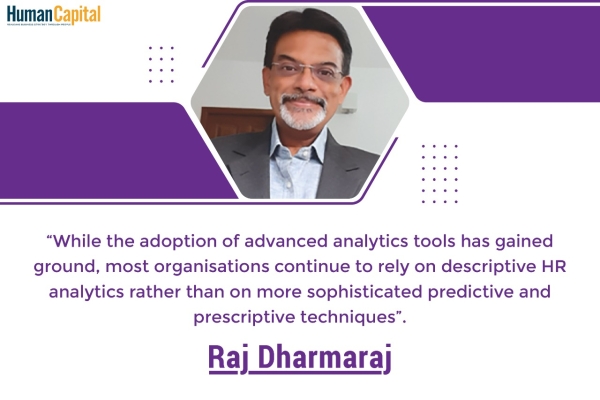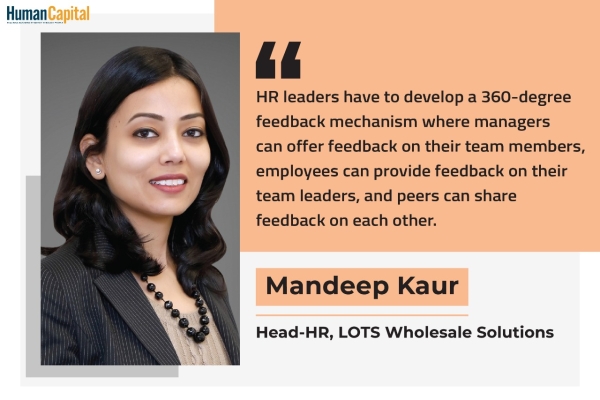Success in the marketplace demands, insights and innovations in HR outcomes of talent, leadership and organisation that deliver value to employees, customers, investors and communities.
These are times when organisations, particularly the start-ups, are left pondering on the ways of generating maximum value from the ‘People Function’. Most start-ups are clueless over how their “People Function” can bring value. Most are looking at the administrative part of crisis management - communication, providing assurance, engaging employees, mental health, work from home practices and so on.
Large companies have the resources and the required specialisation to derive the way over their recovery. On the other hand, small and mid-sized companies are confronted with the burning issue of cash flow. If such a company faces a cash problem, the depth of that problem will determine the way the HR teams are being used since HR strategies must be woven around the available cash.
Companies with less than 6 months leeway
If the runway available is less than 6 months, it will be required to take certain tough decisions. The intensity is really high, and if the HR is not up to the mark, the CEO or the Founder needs to introspect upon the given situation. The Founder needs to drive the HR function to run the following smoothly:-
♦ Shaping the people’s minds to be frugal and bringing a sense to the cost. HR needs to be in the driver’s seat in convincing the top management to take pay cuts (as they are the heaviest paid). Also, it would be a good idea to bring employees together to brainstorm on what needs to be done and allowing every employee to decide their take-home salary and designing a reduced pay cut basis their inputs.
♦ During this period, it is essential to maintain sustained communication with all the employees. The communication must be so that it reassures those who need to be reassured, leaving no room for confusion.
♦ It is absolutely necessary to ensure exits are done in as humane a manner as possible, since exits are inevitable. But it is also important to identify those positions without whom the company cannot scale. HR needs to ponder: How do you handle/ manage them? Can such employees be retained as consultants? Can their expertise be shared with other known companies, affected in a similar way? Can they be a part of a collaboration with another company?
Companies that can sustain for 12 to 18 months
If the company can sustain for 12 to 18 months, it is a great opportunity to test the mettle of the HR function. This is the best the HR team could hope for. The market is low, there are no jobs outside, and people will not be twisting arms with the threat to exit.
While companies will always be mulling on the ways to increase the revenue, the HR is required to be in the driver’s seat:-
♦ To bring the leadership team together - to solicit ideas, to open their minds to experiment, to generate new leads, new products, to instil a sense of urgency, to drive the leaders to think long-term, to forecast on how the landscape will change and so on To revisit the culture as a founder since this is the best opportunity. TheHR should shape and get the culture of the company back on track. The practices which were needed, but were put on hold, must be implemented. It would be futile to have a culture based on values unless they are creating value for the customers and investors. HR needs to instil the mindset of a value boundary. The focus then is not tied to work from home or office, but to the value created for customers.
♦ Performance development needs to be tightened and people must be held accountable. While the dollar maybe stretched, it needs to be invested on grooming the people. This is also the best time to reassign non-performance in a humane way.
♦ Implement succession structures, re-skill and upskill. One of the focus areas of the board or investors will be towards succession planning, as leaders get sick and replacements are needed quickly across operations. Succession planning will go much deeper than the C-suite. ‘Identify, coach & groom your deputies’ will be part of the regular drill. HR must get these practices to stick, making for better management and more flexible workforces.
♦ Building relationships with other companies, to collaborate, to take advantage of when the market opens up.
Companies with a leeway of 18 to 24 months
A leeway of 18 to 24 months leaves sufficient amount of breathing space for a company. However, sticking the HR to administrative or support roles would be tantamount to wasting a crisis.
The competitors are facing difficult times and such situations help them to learn a lot more than what is available to you. They have learnt to manage frugally, how to stretch the dollar, how to experiment, how to negotiate with the clients and the vendors. They have experimented, innovated and built relationships because the crisis forced them to think in ways which can never confront on a normal day. They become capable and when the market opens, they are hungry and able.
You are denied of the experience of what your competitors have learnt in this crisis, as you have the funds, a longer leeway in place and that makes your team complacent. If we assume that the market opens up in 2 years, you are merely tiding over.
By identifying and gaining knowledge, one needs to drive the HR function to generate value –
♦ The need of the hour is to be radical, transformatory, be a visionary over the ways of shaping the market of the future. One must question the validity of setting up the organisation. The external threat must be used as an opportunity to build a strong culture. And it is HR that must enable the leader to pivot the company.
♦ Today, only a few companies are selling in the market today (besides essentials & enablers), and hence it is farcical to carry out a Performance Management exercise. Kill that exercise and push your HR to focus on what matters most to the company, for the future - rewarding innovations, risk taking behaviours, and out of the box thinking. Innovation must be an essential part of the organisational growth model and future success—not a vague hope, fall-back option, or a happy accident.
♦ Focusing on business continuity will lead to failed investments in innovation until the path forward is clear. It may also be short-sighted to play it safe in this situation. The core capabilities that made the organisation distinctive may suddenly be less differentiating, as businesses adapt to new market realities. The past crises may show that innovation-led growth is long-lasting.
♦ HR should be working on opening the minds of the leaders - pushing them to identify those problems the company had in the pre-COVID-19 times. And HR should push your leaders to fix those. Organisations need to pay greater attention to customised services, to unique customer requirements and personalise work, to fit needs of individual employees. Work from Home has just proved that “one size fits all” approach is far and few.
♦ One must make the organisation ready to scale exponentially – This may be the right time to go in for automation or get hold of a customer management software since it is possible to negotiate a better deal.
HR needs to focus on systems, processes and people. People must be trained with the relevant skills and the inline systems must be made ready for scale. While the competitors might have built a relation, and learnt their lessons to keep things lean, one needs to be agile and be betterpositioned to scale quickly. The ability to develop, deliver, and scale new products, services, processes, and business models rapidly will determine the future.
The one thing expected from a Leader is to present the employees with an organisation that succeeds in the marketplace. Without that success in the marketplace, there is no workplace. Success in the marketplace demands, insights and innovations in HR outcomes of talent, leadership and organisation that deliver value to employees, customers, investors and communities.
Follow and connect with us on LinkedIn, Facebook, Instagram, Twitter for latest HR news and insights.
Do you look forward to permanently working from home after the pandemic subsides?
Trending
-
SBI General Insurance Launches Digital Health Campaign
-
CredR Rolls Out 'Life Happens' Leave For Its Employees
-
Meesho Announces 30-Week Gender-Neutral Parental Leave Policy
-
Microsoft Unveils Tech Resilience Curriculum To Foster An Inclusive Future
-
60% Indian Professionals Looking For Job Change Due To COVID: Survey
-
SpringPeople And Siemens Collaborate For Digital Transformation Push
-
86% Professionals Believe Hybrid Work Is Essential For Work Life Balance: Report
-
Almost 1 In Every 3 People's Personal Life Affected Due To Work Stress
-
Meesho Rolls Out Reset And Recharge Policy For Employees
-
80% Of Talent Leaders & Academics Say Pandemic Changed Skill Needs For Youth: Report
-
Hero Electric Rolls Out 'Hero Care' Program For Employees
-
Human Capital In Collaboration With ASSOCHAM Hosts Virtual Conference
-
IKEA India, Tata STRIVE Collaborate To Create Employability And Entrepreneurship Opportunities
-
SAP India, Microsoft Launch Tech Skilling Program for Young Women
-
DXC Technology, NASSCOM Collaborate For Employability Skills Program
-
Lenskart To Hire Over 2000 Employees Across India By 2022
-
Mindtree Launches Learn-and-Earn Program
-
Tata AIA Extends 'Raksha Ka Teeka' To Its Employees
-
Swadesh Behera Is The New CPO Of Titan
-
NetConnect Global Plans To Recruit 5000 Tech Professionals In India
-
Hubhopper Plans To Hire 60% Of Indian Podcasters By 2022
-
Corporate India Needs More Women In Leadership Roles: Report
-
Aon to Invest $30 Million and Create 10,000 Apprenticeships by 2030
-
Tech Mahindra Launches ‘Gift a Career’ Initiative for Upskilling of Youth
-
40% Women Prefer Flexible Working Options in Post-COVID World: Survey
-
3 out of 4 companies believe they can effectively hire employees virtually: Report
-
Vodafone , CGI and NASSCOM Foundation launch digital skills platform
-
Odisha: Bank, postal employees to deliver cash for elderly, differently-abled persons
-
Skill India launches AI-based digital platform for "Skilled Workforce"
-
Hiring activity declines 6.73% in first quarter: Survey
-
70% startups impacted by COVID-19 pandemic
-
Bajaj Allianz Life ropes in Santanu Banerjee as CHRO
-
Over 70 Percent MSMEs look at cutting jobs to sustain businesses
-
93 Per Cent employees stressed about returning to office post-lockdown
-
Johnson & Johnson India announces family benefits for same gender partners
-
Indian firms turning friendly towards working mothers
-
Welspun India names Rajendra Mehta as new CHRO
-
Wipro partners with NASSCOM to launch Future Skills platform



Human Capital is niche media organisation for HR and Corporate. Our aim is to create an outstanding user experience for all our clients, readers, employers and employees through inspiring, industry-leading content pieces in the form of case studies, analysis, expert reports, authored articles and blogs. We cover topics such as talent acquisition, learning and development, diversity and inclusion, leadership, compensation, recruitment and many more.
Subscribe Now












































Comment